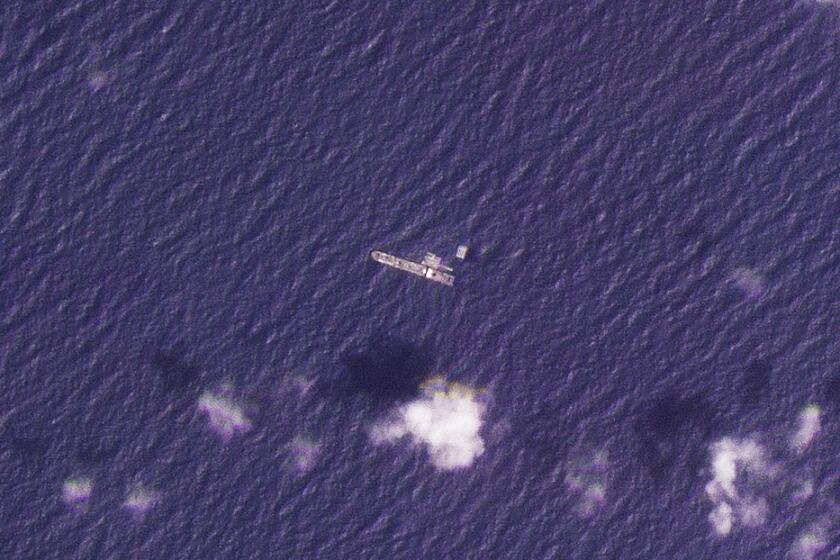Mumbai still feels insecure a year after attacks
In the last year, India has deployed rapid strike law enforcement officers in four cities and purchased night-scope equipment.
Mumbai police increased the numbers of weapons and vehicles at police stations and created specially trained early response units.
Dhananjay Srirang, 38, a constable, said he checks the identity cards of fishermen and boaters in the port, a new procedure, and B. Raman, director at Chennai’s Institute for Topical Studies, said intelligence links with the U.S. have been strengthened.
The changes, all geared toward increasing the sense of safety, came in response to the terrorist attacks in Mumbai one year ago today that left 166 people dead and about 300 injured in a luxury hotel, train station and other locations in across the city.
But many observers say the changes fall far short of providing protection from terrorists or other dangers, and some assert that new safety measures have done nothing to protect Mumbai, a global financial capital formerly known as Bombay.
“The only reason we haven’t been attacked is that the Taliban and Al Qaeda are too busy looking at Pakistan to look here,” said Y.P. Singh, an analyst and former Indian Police Service member. “Ultimately it’s only because they have their hands full.”
Home Minister P. Chidambaram, who has made security a priority, also said recently that the nation is just as vulnerable as before.
Residents are still haunted by the attacks.
Anita Oriya Rajender, a 40-year-old garbage picker who lives near a jetty in Mumbai, remembers seeing the attackers when they came ashore. She had headed down to the jetty that night to brush her teeth before heading for bed in a gritty neighborhood of hovels and fishing boats.
As she neared the water’s edge amid dirty plastic bags lapping gently in the surf, she noticed an inflatable boat carrying six men. They swung duffel bags over their shoulders, hugged one another and flashed a thumbs up sign before heading off in different directions.
“Thirty minutes later I heard blasts and put two and two together,” she said. “Now a year later, I can’t help but thinking if I’d said the wrong thing to them, I’d be dead.”
The 10 attackers killed top Mumbai anti-terrorism cop Hemant Karkare, two colleagues and four civilians near a hospital; 52 at Mumbai’s main railway station; 11 at a trendy cafe and 35 at the Oberoi hotel.
But their main targets appeared to be the city’s five-star Taj Mahal Palace & Tower hotel and a Jewish travelers’ center run by the ultra-Orthodox Chabad Lubavitch sect, where the hostage dramas played out for days.
The attackers’ use of advanced technology, allegedly linking them in real time with Pakistan-based handlers, increased their ability to spread terror.
And the scope of the operation, including its aggressive targeting of foreign and local civilian targets, put terrorist group Lashkar-e-Taiba on the international map, ultimately strengthening U.S.-Indian intelligence sharing and turning Mumbai into a case study for the New York Police Department, FBI and other security agencies.
“The attack made Lashkar-e-Taiba a household name,” said Christine Fair, assistant professor at Georgetown University. “It was Thanksgiving weekend, with many at home watching as it went on and on.”
The attacks also raised some embarrassing questions, including how 10 militants could hold a city hostage for nearly three days. The lone surviving gunman is in custody.
Businessman Bhisham Mansukhani, who was at a wedding at the Taj and who became a hostage, expressed little respect for how the police handled themselves.
“When the firing started, the cops just ran around panicked,” he said. “Some fell out of their trucks. They were just horrible.”
After the attacks, the Indian government came under sharp criticism. Several rounds of finger-pointing followed between rivals India and Pakistan, which was resisting calls to prosecute alleged Lashkar masterminds, part of a group nurtured by Pakistan’s primary spy agency in the 1990s to battle India. On Wednesday, Pakistan charged seven men with helping to plan and execute the Mumbai attacks.
Security analysts said the government has not shown an ability to gather valuable intelligence that might thwart future attacks.
“Ultimately you fight terrorism through intelligence, and ours isn’t very good,” Singh said.
Dr. Kuresh Zirabi, whose ophthalmology clinic is directly across from the Chabad center, said travelers to the U.S. or Australia can see how lax India’s security is in contrast.
“Our system needs repair -- the people, defense and especially the mind-set,” said Zirabi. Red painted circles highlight several dozen bullet marks in the wall of his clinic.
Zirabi hopes the Jewish center is not rebuilt in the neighborhood, he said, not because he opposes its activities but because it could easily become a target again.
But some say the attacks have also underscored the resiliency of Mumbai, a teeming stew of humanity replete with slums, Bollywood studios, the super-rich and the deeply impoverished.
“People showed they were not ready to bow down,” said Remu Javeri, who owns two shops in the Taj hotel and an apartment nearby.
Bharat Gaikwad, a railway policeman, points out bullet holes on the wall and a golden statue of the god Ganesh with flashing lights, only its edge pierced. “See, the idol braved the terrorists,” Gaikwad said. “Its power deflected the bullets.”
Early the day after the attacks, Mumbai’s trains were running, and they have been ever since.
“Bombay can’t come to a standstill,” said Ashok Mokashi, 50, an assistant railway sub-inspector, near a commemoration to a slain railway policeman.
“It’s like sunshine or rain, there’s no stopping it.”
Anshul Rana of The Times’ New Delhi Bureau contributed to this report.
More to Read
Start your day right
Sign up for Essential California for news, features and recommendations from the L.A. Times and beyond in your inbox six days a week.
You may occasionally receive promotional content from the Los Angeles Times.






